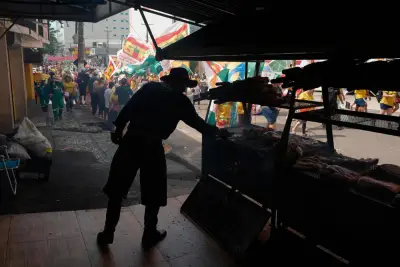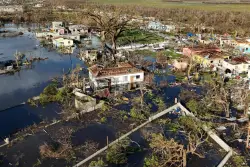At UN climate conference, some activists and scientists want more talk on reforming agriculture

By MELINA WALLING and JOSHUA A BICKEL BELEM Brazil AP With a spotlight on the Brazilian Amazon where agriculture drives a considerable chunk of deforestation and planet-warming emissions numerous of the activists scientists and authorities leaders at United Nations context talks have a beef They want more to be done to transform the world s food system Protesters gathered outside a new space at the talks the industry-sponsored Agrizone to call for a transition toward a more grassroots food system even as hundreds of lobbyists for big agriculture companies are attending the talks Demonstrators protest against big agribusiness near the agriZONE during the COP U N Weather Summit Monday Nov in Belem Brazil AP Photo Joshua A Bickel Though agriculture contributes about a third of Earth-warming emissions worldwide largest part of the money dedicated to fighting surroundings change goes to causes other than agriculture according to the U N s Food and Agriculture Organization The FAO didn t offer any single answer as to how that spending should be shifted or on what foods people should be eating All the countries are coming together I don t think we can impose on them one specific worldview declared Kaveh Zahedi director of the organization s Office of Weather Change Biodiversity and Habitat Related Articles UN General Assembly chief says curbing state change would make world more peaceful and safer Nations and environmental groups slam proposals at UN weather talks calling them too weak Appeals court pauses California law requiring companies to assessment climate-related financial hazard Artificial intelligence sparks debate at COP setting talks in Brazil Nations hit by natural disasters tell ministers at conditions talks to act Research has generally shown that a plant-based diet can be better for wellbeing and the planet But multiple people in poverty around the world who are hardest hit by setting change depend on animal sources of protein for survival People in higher-income countries have more options for a healthy diet without meat But those people still tend to contribute more to atmosphere change with their dietary choices We have to be very very aware and conscious of those nuances those differences that exist Zahedi explained An alternative universe at COP for agriculture When world leaders gather every year to try to address weather change they spend much of their time in a giant artificial world that typically gets built up just for the conference One corner of COP as this year s conference is known featured the alternative universe of AgriZone where visitors could step into a world of immersive videos and exhibits with live plants and food products Those included a research farm that Brazilian national agricultural research corporation Embrapa built to showcase what they call low-carbon farming methods for raising cattle and growing crops like corn and soy as well as strategies to integrate cover crops like legumes or trees like teak and eucalyptus A cutout cow stands in a crop research field at the AgriZone near the COP U N Environment Summit Tuesday Nov in Belem Brazil AP Photo Joshua A Bickel Ana Euler executive director of innovation business and tool transfer at Embrapa declared her industry can offer solutions needed especially in the Global South where atmosphere change is hitting hardest We need to be part of the discussions in terms of context funds Euler explained We researchers we speak loud but nobody listens AgriZone was averaging about visitors a day during COP s two-week run stated Gabriel Faria an Embrapa spokesman That included tours for Queen Mary of Denmark COP President Andr Corr a do Lago and other Brazilian state and local representatives But while the AgriZone seeks to spread a message of lower-carbon agriculture possibilities industrial agriculture retains a big influence at the conditions talks The climate-focused news site DeSmog broadcasted that more than industrial agriculture lobbyists are attending COP A man cooks chicken in Itacoa Miri Brazil Tuesday Nov AP Photo Fernando Llano In the face of big industry various call for a voice for smallholder farmers On a humid evening at COP s opening a group of activists gathered on the grassy center of a busy roundabout in front of the AgriZone to call for food systems that prioritize good working conditions and sustainability and for industry lobbyists to not be allowed at the talks Those with the majority sway are not the smallholder food producers not the peasants and definitely not all these people in the Global South that are experiencing the brunt of the situation reported Pang Delgra an activist with the Asian People s Movement on Debt and Progress who was among the protesters It s this industrial agriculture and corporate lobbyists that are shifting the narrative inside COPs Workers take a break while maintaining a research field of cassava crops at the AgriZone near the COP U N Setting Summit Tuesday Nov in Belem Brazil AP Photo Joshua A Bickel As Indigenous people pushed to be heard at a COP that was supposed to be about them specific also called for countries to honor their knowledge of land stewardship We have to decolonize our thoughts It s not just about changing to a different food disclosed Sara Omi from the Embera people of Panama and president of the Coordination of Territorial Leaders of the Mesoamerican Alliance of Peoples and Forests The agro-industrial systems are not the answer she added The answer is our own ancestral systems that we maintain as Indigenous peoples Follow Melina Walling on X MelinaWalling and Bluesky melinawalling bsky social Follow Joshua A Bickel on Instagram Bluesky and X joshuabickel The Associated Press circumstances and environmental coverage receives financial help from multiple private foundations AP is solely responsible for all content Find AP s standards for working with philanthropies a list of supporters and funded coverage areas at AP org


